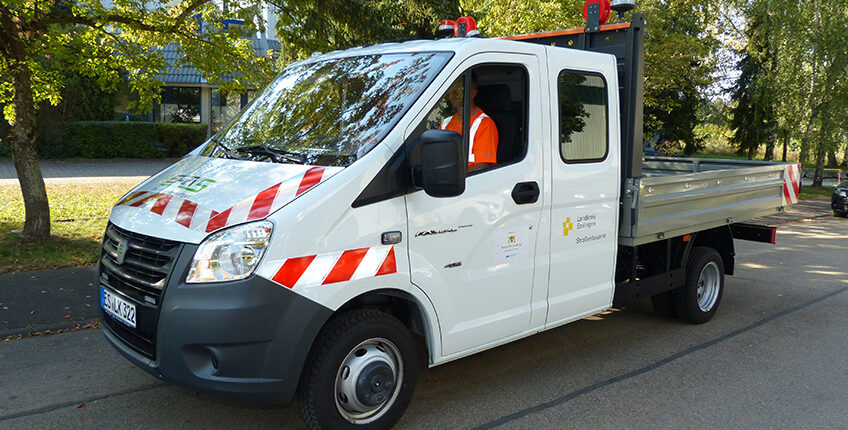The district of Esslingen is venturing into hydrogen technology and procuring two fuel cell utility vehicles for its road maintenance services. The project is being supported by the federal and state governments with more than half a million euros of funding.
Following the procurement of the first battery-electric truck for the road maintenance services last autumn, the district of Esslingen is now taking another big step towards emission-free road maintenance services: Two fuel cell commercial vehicles are being procured for the fleet. With its entry into hydrogen technology, the district is taking a pioneering role in this field and sees itself on the right track in its successful orientation towards future technologies.
The vehicles – which have a gross vehicle weight (GVW) of 4.6 tonnes – are being built as pilot series vehicles for the district as part of the “Emission-free Road Maintenance Services (LKES²)” (“Emissionsfreie Straßenmeisterei”) project. As part of the project, the district is cooperating with the Esslingen University of Applied Sciences / Institute for Sustainable Energy Technology and Mobility (INEM – Institut für nachhaltige Energietechnik und Mobilität) and partners from the regional economy. The project is part of the “H2Rivers” competition entry, with which a showcase for fuel cell mobility is being created along the Rhine and Neckar rivers – from hydrogen production along with distribution and transport to the various mobility applications. Within the scope of the federal government’s HyLand funding programme, the project was selected as the winning region in the “HyPerformer” category.
“For me, it has always been important not to get bogged down in concepts, but rather to take action. Our project is a prime example of the innovative strength of the companies, institutions and universities in our district. With projects such as this, we can provide the impulses for successfully shaping structural change,” says District Administrator Heinz Eininger.
The project is funded by the Federal Ministry of Transport and Digital Infrastructure (BMVI – Bundesministerium für Verkehr und digitale Infrastruktur) within the framework of the National Innovation Programme Hydrogen and Fuel Cell Technology with a total of 388,500 euros. The funding guideline is coordinated by NOW GmbH and implemented by Project Management Jülich (PtJ). The state of Baden-Württemberg is funding the vehicle procurements with an additional 200,000 euros as part of the State Initiative III Market Growth Electric Mobility (Landesinitiative III Marktwachstum Elektromobilität).
Professor Ralf Wörner from Esslingen University of Applied Sciences is supporting the project. The automotive engineering professor emphasises the importance of fuel cell technology for climate protection: “Hydrogen-based applications in the transport sector enable a shift away from greenhouse gas and local emissions and consequently represent an important contribution to achieving the climate targets set for 2030.”
Following the approval of the funding bodies, the path was clear for the signing of the agreement between the district and the company Elektrofahrzeuge Stuttgart (EFA-S) based in Zell unter Aichelberg. The company will manufacture a dual-cab vehicle with a flatbed as well as a crew transport vehicle with a hydrogen technology drivetrain. The first fuel cell truck will then be used in the district’s road maintenance services as early as the first half of 2022.
Although a purely battery-electric drive may be cheaper and less complex, “…but if trucks need to travel more than 500 kilometres a day on electric power, they need to be supplemented by fuel cells and hydrogen tanks for the foreseeable future. Otherwise, the weight of the necessary batteries would limit the payload of the trucks too much,’ says Bastian Beutel, EFA-S’ Managing Director. In the district’s road maintenance depots, he says, it is being demonstrated in exemplary fashion that different powertrains can make sense for different vehicle profiles.
According to scientific and practical experts, the advantages of this vehicle concept lie in the very good market prospects of the vehicles. They are not only suitable for use in road maintenance depots, but also cover the classic range of uses of a vehicle in municipal building yards. A major advantage of this vehicle concept is that the existing hydrogen filling stations operating at 700 bar can be used. In the Esslingen district, such filling stations are already in operation in Wendlingen and at the airport in Stuttgart. Further filling stations will become operational in the next few years.


